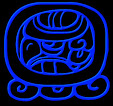"God" Was A Four-Letter Word...
"In the beginning was the Word, and the Word was with God, and the Word was God." ~ John 1:1
And yet few ever bother asking what that word [Logos, transliterated from Greek: λόγος] was!
It sure as hell wasn't the Danish / Dutch / Germanic offshoot everyone is so fond of these days: G-O-D.
The Christians of Byzantium (founded by Constantine) to whom ALL contemporary believers in Christ owe their creed had a very different set of names for the 'Lord'.
i.e. the less catchy: Hupsistos or, if you prefer: Pantocrator.
Going back further to the Hebrew Torah, it was forbidden to speak the Tetragrammaton (four letters) of YHWH, from where Jehovah is derived. Vowels were excluded — thus confounding said pronoun.
There's immense wisdom in this approach because really, how could an almighty Being be reduced to a few mere syllables, becoming sullied by the utterance of our mortal tongues?
Unfortunately, mainly due to differences in languages, most polemics regarding the existence or nature of God amount to nothing other than disagreements concerning one's preferred Signifier.
As a result, religious fundamentalism rather restricts spiritual evolution through its dogmatic use of
linguistic concepts that people become emotionally attached to. It would indeed seem that Faith is largely a matter of subjective sentimentality.
Even more vexingly, these emotional tendencies can carry negative side-effects. For instance, within the blackened hearts of those firebrands where anger and hate predominate.
Even more vexingly, these emotional tendencies can carry negative side-effects. For instance, within the blackened hearts of those firebrands where anger and hate predominate.
As a Philologist, Friedrich Nietzsche was aware of the above fallacies and famously declared that "God is dead". This is because he saw people not worshiping divinity directly, but only going through empty motions and reciting the rosary without any real reflection.
In fact, some Post-Modern thinkers have accused the whole Western Metaphysical tradition of Logocentrism; an incurable obsession with that primal WORD — leading to centuries of bloody conflict.
The Truth is that Allah / God / Krishna / Yahweh (whatever) is simply beyond the scope of finite human thought and most certainly ineffable. Now that we have entered a new millennium, it no longer serves anybody to squabble over such limiting names. We ought to move forward from here and embark on a mission of mutual comprehension!



 Newer Posts
Newer Posts




